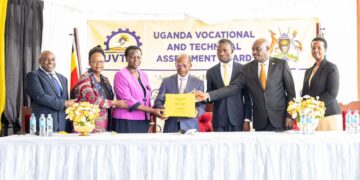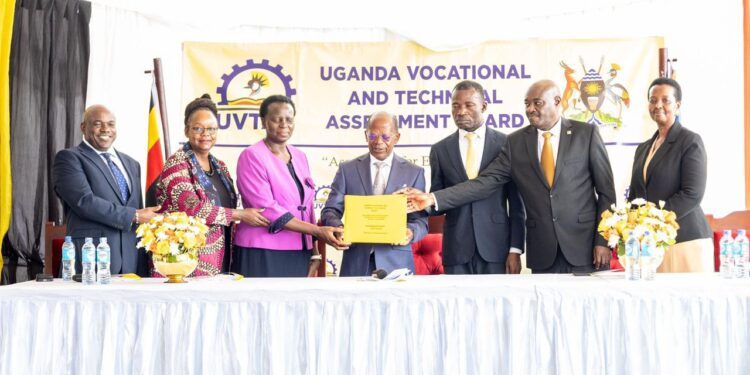The Uganda Vocational and Technical Assessment Board (UVTAB) has released the much awaited Nov/Dec 2024 Technical and Vocational Assessment exams.
The assessments were conducted from November 19 to December 18, 2024, from 573 Assessment Centres.
These were the the last assessments conducted by Uganda Business and Technical Examinations Board (UBTEB) before the commencement of the TVET Act 2025.
According to Onesmus Oyesigye UVTAB Executive Secretary, the Board registered a total of 31,890 (12,111 female and 19,779 male) candidates. From this, 503 (2%) registered for diploma programmes assessments and 31,387(98%) registered for Certificate programmesassessment.
The assessments were conducted as per the then-existing broad categories of programmes; Technical and Vocational assessment results, The Business and Humanities assessment results and the Physical and Biological Sciences results.
Out of the total final year candidates, 26,703 representing 84% registered for National Certificate in technology related programmes assessment.
The second category registered for Business and other humanities assessment and this was 4,937 representing 15 percent while only 250 candidates registered for Physical & Biological Sciences representing 1 percent.
A total of 29,378 (92%) out of those who registered turned up for the assessment.
A total of 173 candidates with special needs from 120 centres registered and 100 of them needed assessment support Personnels.
173 candidates had special needs(53 female & 120 males) 34 candidates had Dyslexia, 43 candidates had Visual impairment, 31 candidates had hearing impairment and 65 candidates had physical disabilities.
Oyesigye revealed that out of the 29,378 that sat, 26,680 (91%) of the candidates satisfied the requirements for full competences acquisition, and they will exit into the world of work for employment or progress for further training.
He noted that these were conducted without any Assessment question paper leakage. “This is attributed to a team of professional item writers, moderators and Secretariat staff among other stakeholders.”
Oyesigye said the absence of the TVET Qualifications Framework has made the alignment, grading, and classification of the informally acquired skills and competences difficult due to the lack of a clear point of reference.
He noted that the TVET Qualifications Framework as a progressive pathway needs to be worked on to streamline classification and grading of TVET qualifications.
The Minister of Education and Sports, also First Lady, Janet Museveni, in her remarks delivered by the Minister Of State for Higher Education John C Muyingo, said she has taken note of the need to expedite the process of TVET Qualifications Framework to allow smooth career progression pathways.
“The TVET Council and other enabling legal framework is already in place,and sooner than later the TVET Qualification framework will be in place too,” she noted.
She emphasized the importance of continuous collaboration among all stakeholders, especially the private sector, industry, and trainees.
“Our focus remains on ensuring that training is relevant, of high quality, and aligned with labour market demands. The enactment of the TVET Act 2025 has laid a firm foundation for this, providing a regulatory framework that supports innovation, industry engagement, and skills recognition for all pathways.”
She urged all TVET providers to build collaborations and partnerships with stakeholders to ensure compliance with the law, standards, and policies on regulation, delivery, and assessment.
Allen Kagina the TVET Council Chairperson, noted that the Council will ensure that all artisans and Technicians are registered and regulated in their professions to enhance the quality of goods and services offered to the Economy.
“This intervention reinforces the already existing regulatory efforts by professional bodies like the Uganda Institution of Professional Engineers and the Engineers Registration Board (ERB). The Council’s success is premised on how well TVET stakeholders will be integrated and involved in all stages and processes right from curriculum design, delivery, assessment, certification and regulation of the TVET graduates.”
Professor Dorothy Okello, UVTAB Chairperson noted that the Board is ready to implement the TVET Act 2025, as a major ingredient of the TVET reforms that emphasize the significant role played by the industry.
“This guarantees ‘Training with Production’ that helps in enriching the learning experience. This model helps trainees to acquire practical skills while simultaneously contributing to production activities, thereby reinforcing their learning with real-world applications,” she said.









